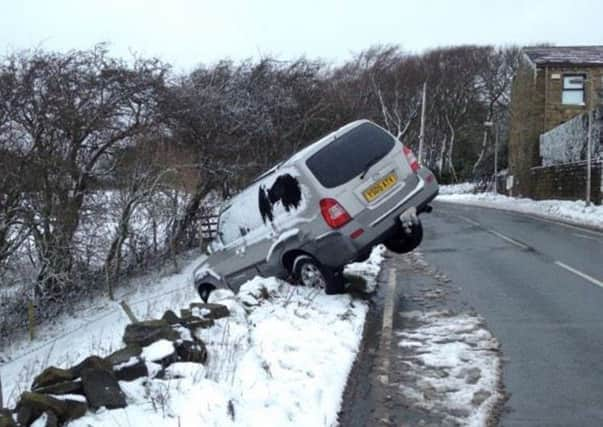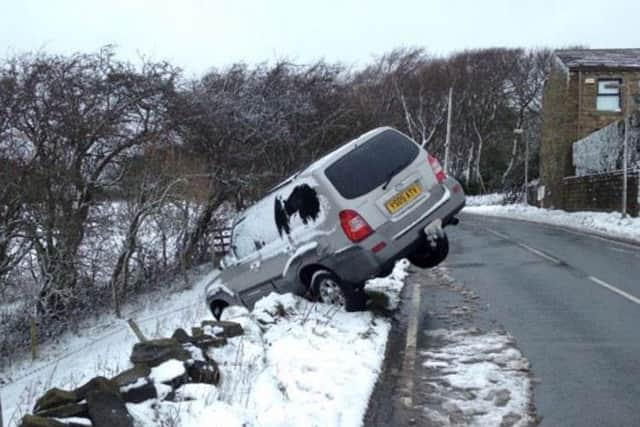Video: Yorkshire shivers as travellers hit by ‘thundersnow’
This article contains affiliate links. We may earn a small commission on items purchased through this article, but that does not affect our editorial judgement.


Dozens of schools have been closed across Sheffield and Huddersfield while trains between York and Manchester were cancelled “as a precaution”.
The snow comes as forecsters predict the North will be worst hit with “thundersnow storms” striking, while snowfalls of up to 15cm are predicted tonight. (Jan 29)
Advertisement
Hide AdAdvertisement
Hide AdThere are fears the plummeting temperatures could endanger the health of the elderly and vulnerable and cause travel disruption as the snow showers are expected to hit during this morning’s rush hour.


The Met Office has issued an amber “be prepared” snow warning covering large swathes of Britain, from Liverpool Bay across to the Humber to the western side of the Welsh mountains.
Met Office forecaster Simon Partridge said: “We have got snow falling in a number of areas in the North and West, including thunderstorms.
“There is thundersnow to the north of Manchester - these are normal thunderstorms but with snow rather than rain. The lightning on the white flakes is quite dramatic.
Advertisement
Hide AdAdvertisement
Hide Ad“The snowfall is going to continue throughout the night. In the amber area we could see more than 5cm of snow, and more than 15cm on higher ground.
“Quite a few places will be seeing heavy snow showers during the morning’s rush hour. This is expected in the north west of England, on the M6 north of Cheshire and over Scotland.
“The impact on peoples’ lives will be more pronounced as people will be trying to get to work and school.”
Advertisement
Hide AdAdvertisement
Hide AdForecasters warned there was a chance snow could hit as far south as Greater London.
Cold blasts from Greenland and Iceland will send the mercury plummeting to around 2-3 C in the North and 4-5 C in the South today.
Showers and overnight frosts also bring the risk of icy stretches forming on untreated surfaces, while strong winds will accentuate the bitter cold feel.
The weather will turn slightly milder on Friday, reaching up to 7C in the South.
Advertisement
Hide AdAdvertisement
Hide AdBut an Arctic blast will send a fresh wave of snow and freezing temperatures over the weekend.
The Met Office has issued snow warnings for the weekend and said more could be put in place.
Snow is predicted to hit the north of Scotland and Northern Ireland on Saturday, and is expected to spread down both sides of the UK on Sunday, hitting western Wales, south-west England, east Anglia and the east coast of England.
Temperatures will struggle to get above freezing in parts of the North on Sunday.
Advertisement
Hide AdAdvertisement
Hide AdMr Partridge said: “Not until the middle or end of next week will we see the possibility of things changing to milder conditions.”
Health experts warned of the possible dangers and urged the vulnerable to stay warm and not to take unnecessary risks.
Dr Angie Bone, head of extreme events at Public Health England, said: “Parts of England are really going to feel cold for the next few days so it’s really important people take extra care when out and about.
“It’s worth remembering that most outdoor slips, trips and falls in weather like this are of those who are of working age, accidents can happen to anyone. So if you’re heading out, wear lots of thin layers and shoes with a good, slip-resistant grip.
Advertisement
Hide AdAdvertisement
Hide Ad“If you’re staying indoors, have plenty of warm food and drinks to stay warm. Try to maintain indoor temperatures to at least 18C, particularly if you are not mobile, have long-term illness or are over 65 and check weather forecasts and plan your day around them.
“Also take some time to think about how the bad weather may affect your friends and family, particularly if they are older or very young or have pre-existing health conditions. These groups can be particularly vulnerable to the ill-effects of cold and it’s important we all do what we can to protect those around us.
“Although most of our advice on keeping warm and well in cold weather may seem like common sense, it’s important to remember that cold kills, even in places where the temperatures aren’t at their lowest.”
Darron Burness, head of the AA’s severe weather team, said: “As we have seen in the States this week, the weather is changeable and hard to predict, so keep tuned to local radio for the weather and travel updates.
Advertisement
Hide AdAdvertisement
Hide Ad“The wind could cause the snow to drift, leading to some pretty horrible and potentially treacherous driving conditions, so allow extra time for your journey and heed any police advice about whether it’s safe to travel - you may need to delay your journey.
“If there is snow where you are, clear it off your car’s windows, lights and roof before leaving and try to stick to the main roads where possible - better to have a longer journey than risk getting stuck.
“Gentle manoeuvres are the key to safe driving on snow and ice and leave a much bigger gap between you and the vehicle in front.
“The wind will also make it feel bitterly cold, so at the very least take lots of warm layers, fully-charged mobile, road atlas, and make sure your car has at least a quarter of a tank of fuel in case of unexpected delays.”
Advertisement
Hide AdAdvertisement
Hide AdRAC spokesman Simon Williams said: “This winter’s yo-yo style weather continues - relatively mild, wet and blustery one week, cold with snow and ice for some the next.
“The message to drivers is to plan ahead - perform some quick and easy checks on the condition of your vehicle, such as tyres and windscreen wipers, as soon as possible.
“Then, when out on the road, be on your guard, responding to the rapidly changing conditions and adjusting your driving style as necessary.”
In Scotland, forecasters said more than 2in (5cm) could accumulate at lower levels by this morning, with more than 6in (15cm) on high ground, prompting Police Scotland to issue travel advice to motorists.
Chief Inspector Louise Blakelock said: “There is a risk of localised disruption to travel likely and we would ask motorists to take precautions before they set off.”